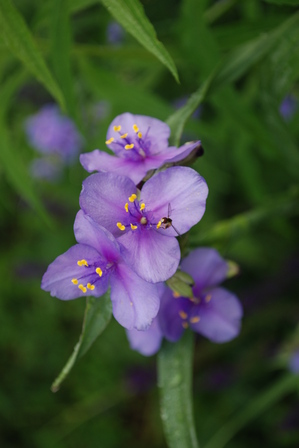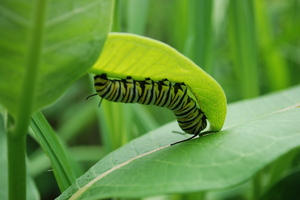Native plants star Douglas Tallamy coming to speak in Ann Arbor

A Spiderwort (Tradescantia ohiensis) provides food for a tiny little pollinator.
Rick Meader | Contributor
Okay, admittedly the extent of the native plant sea does not match that of the Pacific Ocean, or even the Indian Ocean, but some important proponents of the value of native plants, and the danger of some non-native (alien) plants, are having a significant impact on landscapes and legislation across the globe. One such person is coming to town this week for a free public talk entitled “Are Alien Plants Bad?”
Douglas Tallamy, author of "Bringing Nature Home," is a dynamic speaker and will be speaking this Thursday, Oct. 27 at 7:30 p.m. in the Stamps Auditorium of the Walgreen Drama Center.
Some of you may remember that I wrote about Dr. Tallamy’s book last year. If you don’t, follow the link to that entry.
For a long time now, I’ve enjoyed native plants and felt that it was important to use them in the landscape. At first, it was from a practical point of view, that native plants, being adapted to the soils and conditions of an area, require less care in the form of fertilizers and pesticides than plants from foreign localities.
Then, it became a quest to support the underdog, as many natives get less play in the media and mainstream nurseries than non-natives, and they may be overrun by non-natives in their natural habitats. But, when I read Bringing Nature Home, native plants took on an even greater importance in my mind, as a means to support native insects and the animals that feed on them.
In fascinating and great detail, Tallamy shows how native insects have evolved over a great period of time (thousands of years) to be able to feed on specific plants, and why it was necessary to do so. With this specificity developed a vulnerability, too, in that these insects must have these specific plants to survive. Without the plants, they will die, and the predator populations that feed on them will also suffer.

A monarch caterpillar stays hidden on its host, a common milkweed (Asclepias syriaca).
Rick Meader | Contributor
Tallamy focuses on the impact on the insect/bird interaction that he has studied, but it’s not too great a leap to also feel that the reptiles and amphibians that also feed on native insect populations are negatively impacted by a decrease in native insect populations. It follows, then, that if you want to help out wildlife, whether it is interesting and/or beautiful insects, or birds or frogs or turtles, then planting native plants in your landscape can do just that.
I encourage you to read his book, or look at his website, (http://bringingnaturehome.net/) and come to his talk this Thursday. He is an engaging speaker, and if you are already a native plant enthusiast, you’ll be entertained and informed. If you just have a passing interest or curiosity about native plants, you will learn some things that could very well open your eyes to the importance of native plants, and the impact of alien plants on the wild landscape that is becoming less and less wild.
For a sneak peak, take a look at this short YouTube video: http://www.youtube.com/watch?v=xLn5UCM_tv8.
Hope to see you there!
Rick is a local landscape architect with a special interest in all things natural, including creating designs that include a lot of native plants (and the critters they support). You can contact him at yourland1824@gmail.com.


Comments
Guerin Wilkinson
Wed, Oct 26, 2011 : 5:36 p.m.
If we want to have an intelligent discussion about alien plants, we should drop some of the prevailing silliness, such as the notion that native plants require less water and fertilizer. Depends on the plant of course. One cannot complain that alien plants require additional inputs, at the same time bemoaning that they are outcompeting natives.
Rork Kuick
Mon, Oct 24, 2011 : 12:44 p.m.
"It follows, then, that if you want to help out wildlife, whether it is interesting and/or beautiful insects, or birds or frogs or turtles, then planting native plants in your landscape can do just that." And you could come help work on gigantic landscapes with groups of like-minded people, like the Waterloo/Pinckney and many other recreation areas, or other public lands being helped by stewardship. It might look like we work only on plants, but our T-shirts mostly name endangered insects and vertebrates. As always: stewardshipnetwork.org has lots of volunteer opportunities.